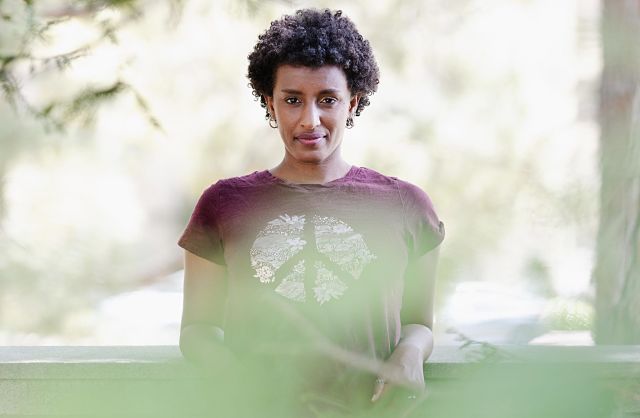 Rediet Abebe uses the tools of theoretical computer science to understand pressing social problems — and try to fix them. Rediet, who holds a doctorate in computer science from Cornell University, is a co-founder of the organizations Black in AI. (Photo: Quanta Magazine)
Rediet Abebe uses the tools of theoretical computer science to understand pressing social problems — and try to fix them. Rediet, who holds a doctorate in computer science from Cornell University, is a co-founder of the organizations Black in AI. (Photo: Quanta Magazine)
Quanta Magazine
A Computer Scientist Who Tackles Inequality Through Algorithms
When Rediet Abebe arrived at Harvard University as an undergraduate in 2009, she planned to study mathematics. But her experiences with the Cambridge public schools soon changed her plans.
Abebe, 29, is from Addis Ababa, Ethiopia’s capital and largest city. When residents there didn’t have the resources they needed, she attributed it to community-level scarcity. But she found that argument unconvincing when she learned about educational inequality in Cambridge’s public schools, which she observed struggling in an environment of abundance.
To learn more, Abebe started attending Cambridge school board meetings. The more she discovered about the schools, the more eager she became to help. But she wasn’t sure how that desire aligned with her goal of becoming a research mathematician.
“I thought of these interests as different,” said Abebe, a junior fellow of the Harvard Society of Fellows and an assistant professor at the University of California, Berkeley. “At some point, I actually thought I had to choose, and I was like, ‘OK, I guess I’ll choose math and the other stuff will be my hobby.’”
After college Abebe was accepted into a doctoral program in mathematics, but she ended up deferring to attend an intensive one-year math program at the University of Cambridge. While there, she decided to switch her focus to computer science, which allowed her to combine her talent for mathematical thinking with her strong desire to address social problems related to discrimination, inequity and access to opportunity. She ended up getting a
Today, Abebe uses the tools of theoretical computer science to help design algorithms and artificial intelligence systems that address real-world problems. She has modeled the role played by income shocks, like losing a job or government benefits, in leading people into poverty, and she’s looked at ways of optimizing the allocation of government financial assistance. She’s also working with the Ethiopian government to better account for the needs of a diverse population by improving the algorithm the country uses to match high school students with colleges.
Abebe is a co-founder of the organizations Black in AI — a community of Black researchers working in artificial intelligence — and Mechanism Design for Social Good, which brings together researchers from different disciplines to address social problems.
Quanta Magazine spoke with Abebe recently about her childhood fear that she’d be forced to become a medical doctor, the social costs of bad algorithmic design, and how her background in math sharpens her work. This interview is based on multiple phone interviews and has been condensed and edited for clarity.
You’re currently involved in a project to reform the Ethiopian national educational system. The work was born in part from your own negative experiences with it. What happened?
In the Ethiopian national system, when you finished 12th grade, you’d take this big national exam and submit your preferences for the 40-plus public universities across the country. There was a centralized assignment process that determined what university you were going to and what major you would have. I was so panicked about this.
Why?
I realized I was a high-scoring student when I was in middle school. And the highest-scoring students tended to be assigned to medicine. I was like 12 and super panicked that I might have to be a medical doctor instead of studying math, which is what I really wanted to do.
What did you end up doing?
I thought, “I may have to go abroad.” I learned that in the U.S., you can get full financial aid if you do really well and get into the top schools.
So you went to Harvard as an undergraduate and planned to become a research mathematician. But then you had an experience that changed your plans. What happened?
I was excited to study math at Harvard. At the same time, I was interested in what was going on in the city of Cambridge. There was a massive achievement gap in elementary schools in Cambridge. A lot of students who were Black, Latinx, low-income or students with disabilities, or immigrant students, were performing two to four grades below their peers in the same classroom. I was really interested in why this was happening.
Read the full Q & A at quantamagazine.org »
—
Join the conversation on Twitter and Facebook.

























